I t is my pleasure to teach Laurence Sterne’s brilliant and incomparable A Sentimental Journey through France and Italy (only the early sections) next week, so I looked it up in Archive.org – turns out they do have this 1774 edition of the work, in excellent condition, and I think that is amazing. I will try to update this post after I teach it, next week. Love this passage
t is my pleasure to teach Laurence Sterne’s brilliant and incomparable A Sentimental Journey through France and Italy (only the early sections) next week, so I looked it up in Archive.org – turns out they do have this 1774 edition of the work, in excellent condition, and I think that is amazing. I will try to update this post after I teach it, next week. Love this passage
“It will always follow from hence, that the balance of sentimental commerce is always against the expatriated adventurer: he must buy what he has little occasion for, at their own price;—his conversation will seldom be taken in exchange for theirs without a large discount,—and this, by the by, eternally driving him into the hands of more equitable brokers, for such conversation as he can find, it requires no great spirit of divination to guess at his party—
This brings me to my point; and naturally leads me (if the see-saw of this désobligeant will but let me get on) into the efficient as well as final causes of travelling—
Your idle people that leave their native country, and go abroad for some reason or reasons which may be derived from one of these general causes:—
Infirmity of body,
Imbecility of mind, or
Inevitable necessity.The first two include all those who travel by land or by water, labouring with pride, curiosity, vanity, or spleen, subdivided and combined ad infinitum.”




